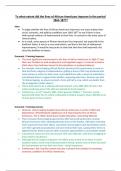Essay
To what extent did the lives of African Americans improve in the period ?
- Institution
- PEARSON (PEARSON)
This is an A* essay plan that i used for my history A-level, answering the question To what extent did the lives of African Americans improve in the period ? It provides many in depth points and facts that you can revise and use should this question come up
[Show more]



